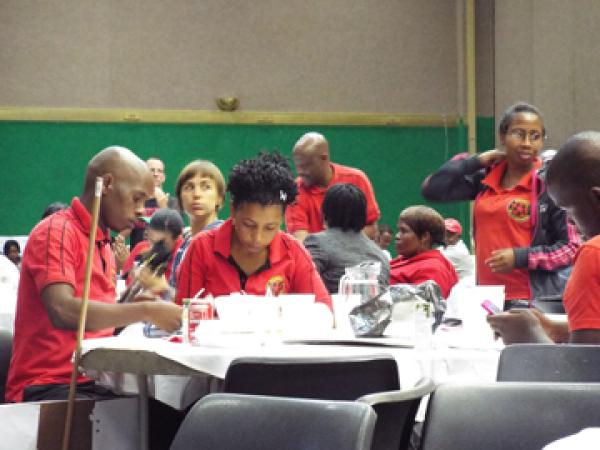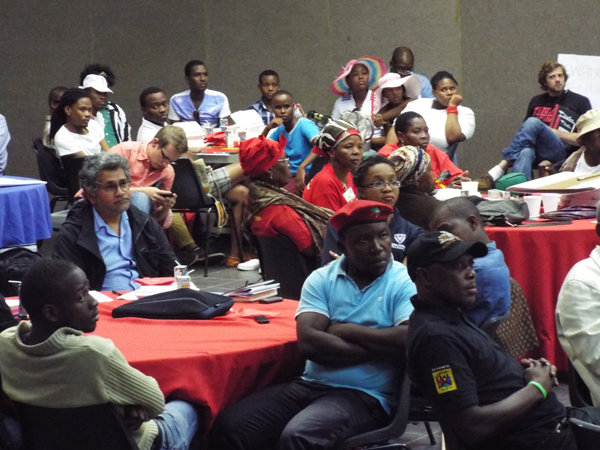Awethu! - the people demand a better democracy

At a mass meeting on 28 November 2013, academics and activists from dozens of organisations, social movements, and local citizen groups from eight provinces came together as Awethu!.
The diversity of the attendees was evident, reflected in the numerous languages overheard in discussions. around such highly contested issues as land reform and power.
2014 will be a significant year for South Africa. Not only will the country be holding national elections, but it will be the 20th year of democracy. Yet for tens of millions of people, access to quality education, health, housing and employment remains elusive.
“We are committed to the real end of apartheid,” shouted a participant. “We want an end to the oppression of the past that continues”.
The purpose of the meeting was to attempt to identify ways of working together on various social justice struggles that will be inclusive and give space to ‘new’ voices - voices of the people directly affected by these struggles.
Awethu! is not a new organisation and will not replace existing initiatives. It will be a mechanism through which relationships between organisations, citizens and those with the country’s best interests at heart, can be strengthened.
Participants noted that in the past fragmentation among civil society organisations disrupted the deepening of democracy.
Mazibuko Jara, who co-chaired the meeting with Sisonke Msimang, constantly emphasised how the platform is a collective effort, not owned by a single person or organisation.
“Why not question the current political apathy towards people”
Jara also remarked how the low turnout for the first voters registration weekend saw people described as apathetic. “Why not question the current political apathy towards people,” he asked to a chorus of agreement.
His sentiment was echoed by another participant who said, “Elected councillors are not accessible to informally settled communities. We only see them at election time”.
The focus was however not only on government; private business was also seen as a big barrier with “undemocratic principles”.
“They are silent when we are killed by police, but even worse, they deny us survival,” was heard in the room.

Academics and activists from more dozens of organisations, social movements, and local citizen groups from eight provinces came together as Awethu!. Photo by Koketso Moeti.
The plight of workers was a recurring theme, with questions asked about why we speak about a minimum wage, but not a maximum wage, and why a minimum wage, instead of a living wage.
While there were many contesting ideas and thoughts, in particular on the role and value of the Constitution, it was clear that there was a common sense of dissatisfaction. Where the dissatisfaction arises however, varied greatly between participants.
The meeting resolved to undertake a “people’s audit” of election manifestos and the top 20 politicians on the lists of the major parties, and to set the agenda for the coming 20 years of democracy, an agenda owned and driven by the people.
The real test will be to see how the organisations present at Awethu! can overcome all that separates them.
These organisations attended the Awethu! meeting:
Afesis Corplan, Black Sash (BS), Caring Heart for All Movement, Centre for Law & Society (UCT), Charities Aid Foundation Southern Africa, Community Law Centre (UWC), COPAC, CORE, Cormsa, Corruption Watch, Democracy From Below, Equal Education, Equal Education Law Centre, FXI, Gays and Lesbians of Rustenburg, Heinrich Boell (HBF), Ivory Park Solidarity Economy Cooperative, Jo’burg People’s Pride, Few, Khanya AiCDD, Legal Resources Centre, Library Association of South Africa, Local government Action , Media Monitoring Africa, My X Counts Campaign, Ndifuna Ukwazi, New Women’s Movement, Oxfam, PMG, R2K, SACC, SACSIS, Section27, Socio-Economic Rights Institute of South Africa (SERI), Social Justice Coalition (SJC), Sonke Gender Justice, Studies in Poverty & Inequality Institute (SPII), Students for Law and Social Justice (SLSJ), SWEAT, TAC.
Next: Rural Health: grossly unequal but some hope
Previous: The need to remember history - and to plan political homes

This article is licensed under a Creative Commons Attribution-NoDerivatives 4.0 International License.


